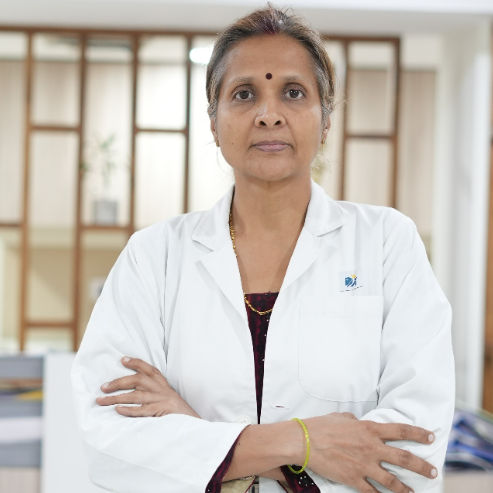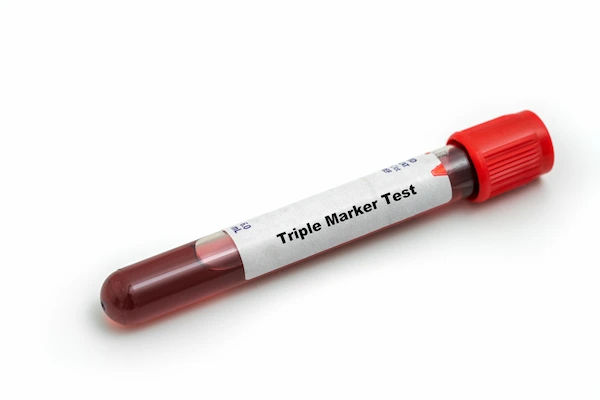Quadruple Marker Test Overview and Details
Learn about the Quadruple Marker Test in pregnancy—its purpose, timing, procedure, results, and what they mean for your baby’s health.


Pregnancy is a beautiful journey, but it also comes with many questions and concerns about the baby’s health. One of the important tests recommended during pregnancy is the Quadruple Marker Test (Quad Test). If your doctor has suggested this test, you might be wondering what it is, why it’s needed, and what the results mean. Don’t worry; we’re here to explain everything in simple terms.
What is the Quadruple Marker Test?
The Quadruple Marker Test is a prenatal screening test done between 15 to 20 weeks of pregnancy (ideally between 16 to 18 weeks). It measures four substances in the mother’s blood to assess the risk of certain genetic conditions or birth defects in the baby.
The four markers tested are:
- Alpha-fetoprotein (AFP) – Produced by the baby’s liver.
- Human Chorionic Gonadotropin (hCG) – A pregnancy hormone.
- Unconjugated Estriol (uE3) – A form of estrogen produced by the placenta and baby.
- Inhibin A – A hormone produced by the placenta.
Why is the Quad Test Done?
The Quad Test helps identify the risk of:
- Down syndrome (Trisomy 21) – A genetic disorder causing developmental delays.
- Edwards syndrome (Trisomy 18) – A severe chromosomal disorder.
- Neural tube defects (like spina bifida) – Problems in the baby’s spinal cord or brain development.
It’s important to note that this test does not diagnose these conditions but only tells if there’s a higher or lower risk. If
the results show a high risk, your doctor may recommend further tests like amniocentesis or ultrasound for
confirmation.
Who Should Take the Quad Test?
The Quad Test is recommended for all pregnant women, especially if:
- You are 35 years or older (higher risk of chromosomal abnormalities).
- You have a family history of genetic disorders.
- Previous pregnancies had chromosomal abnormalities.
- You had abnormal ultrasound findings.
However, even if you don’t fall into these categories, your doctor may still suggest it as a routine screening.
How is the Test Done?
The Quad Test is a simple blood test where a small sample is taken from your arm. No fasting or special preparation is
needed. The results usually take a few days, and your doctor will explain them to you.
Understanding the Results
The test results are given as a risk ratio, such as 1 in 500 or 1 in 1000. A higher ratio (e.g., 1 in 100) means higher risk,
while a lower ratio (e.g., 1 in 2000) means lower risk.
- Low Risk – No further testing is usually needed.
- High Risk – Your doctor may suggest additional diagnostic tests like amniocentesis or a detailed ultrasound.
Remember, a high-risk result does not mean your baby has a disorder; it just means more tests are needed to be sure.
Consult an Gynecologist for the best advice
What If the Results Are Abnormal?
If your test shows a higher risk, don’t panic. Many women with abnormal Quad Test results go on to have healthy
babies. Your doctor may recommend:
- Detailed ultrasound – To check the baby’s growth and development.
- Amniocentesis – A test where a small amount of amniotic fluid is taken to analyze the baby’s chromosomes.
- Genetic counseling – To discuss risks and next steps.
Are There Any Risks?
The Quad Test is safe; it’s just a blood test with no risk to you or your baby. However, if further tests like amniocentesis are needed, they carry a small risk of miscarriage. Your doctor will discuss this with you.
Tips for a Healthy Pregnancy
While the Quad Test helps assess risks, maintaining a healthy pregnancy is equally important. Here are some tips:
- ✔ Eat a balanced diet – Include fruits, vegetables, whole grains, and proteins.
- ✔ Take prenatal vitamins – Especially folic acid, which helps prevent neural tube defects.
- ✔ Stay active – Gentle exercises like walking or prenatal yoga can help.
- ✔ Avoid smoking and alcohol – These can harm your baby’s development.
- ✔ Attend all prenatal check-ups – Regular visits help monitor your baby’s growth.
When to Consult a Doctor?
If you:
- Are unsure whether to take the Quad Test.
- Have concerns about your pregnancy.
- Need help understanding your test results.
Consult your doctor or book an appointment with a specialist on Apollo 24|7 for expert guidance.
Get Your Health Assessed
Final Thoughts
The Quadruple Marker Test is a useful screening tool that helps detect potential risks early in pregnancy. While it can be stressful waiting for results, remember that most pregnancies are healthy, and even if further tests are needed, they provide clarity.
Need to schedule a Quadruple Marker Test or consult a doctor?
Book an appointment on Apollo 24|7 today!
Consult an Gynecologist for the best advice
Consult an Gynecologist for the best advice

Dr. Rupashree Dasgupta. Gynaecological Oncology
Gynaecological Oncology & Robotic Surgery
26 Years • MD(Gold Medalist, CMC Vellore), DGO(Gold Medalist, CMC Vellore),DNB, MRCOG(London), MBBS(FOGSI Gold Medalist in Gynaecology).Specialist in Advanced Laparoscopic & Robotic Surgery, UICC Fellowship in Gynae Oncosurgery(BARTS Cancer Institute, LONDON), da Vinci certified training as ROBOTIC CONSOLE Surgeon(USA), Fellowship Gynae Oncosurgery(TMC, Kolkata)
Kolkata
Apollo Multispeciality Hospitals , Kolkata, Kolkata
(375+ Patients)

Dr. Sai Lakshmi Daayana
Gynaecological Oncologist
18 Years • MBBS, MRCOG
Hyderabad
Apollo Hospitals Jubilee Hills, Hyderabad
(225+ Patients)

Dr. Monika Meena
Gynaecological Oncology & Robotic Surgery
12 Years • MBBS (AIIMS, New Delhi), MD (OB-GYN, PGIMER), FMAS, DMAS, MRCOG
Kolkata
Apollo Multispeciality Hospitals , Kolkata, Kolkata
(75+ Patients)

Dr Bhawna Garg
Gynaecological Oncologist
26 Years • MBBS, MS, (PGI MS ROHTAK) FELLOWSHIP GYNECOLOGY ONCOLOGY, (CANCER INSTITUTE CHENNAI)
Delhi
Apollo Hospitals Indraprastha, Delhi

Dr. Amit Choraria
Surgical Oncologist
18 Years • MBBS, MS (Surgery) Fellow, Surgical Oncology, Tata Medical Center (FSO) Fellow, European Board of Surgery (Surgical Oncology) (FEBS) Fellow, Minimal Access Surgery (FMAS) Fellow, Indian Association of Gastrointestinal Endosurgeons (FIAGES) UICC Fellow, Royal Marsden NHS, London, UK Visiting Scholar, Plastic Reconstructive Surgery, CGMH, Taiwan Fellow, Robotic Surgical Oncology, Vattikuti Foundation, USA
Kolkata
Apollo Multispeciality Hospitals , Kolkata, Kolkata
Consult an Gynecologist for the best advice

Dr. Rupashree Dasgupta. Gynaecological Oncology
Gynaecological Oncology & Robotic Surgery
26 Years • MD(Gold Medalist, CMC Vellore), DGO(Gold Medalist, CMC Vellore),DNB, MRCOG(London), MBBS(FOGSI Gold Medalist in Gynaecology).Specialist in Advanced Laparoscopic & Robotic Surgery, UICC Fellowship in Gynae Oncosurgery(BARTS Cancer Institute, LONDON), da Vinci certified training as ROBOTIC CONSOLE Surgeon(USA), Fellowship Gynae Oncosurgery(TMC, Kolkata)
Kolkata
Apollo Multispeciality Hospitals , Kolkata, Kolkata
(375+ Patients)

Dr. Sai Lakshmi Daayana
Gynaecological Oncologist
18 Years • MBBS, MRCOG
Hyderabad
Apollo Hospitals Jubilee Hills, Hyderabad
(225+ Patients)

Dr. Monika Meena
Gynaecological Oncology & Robotic Surgery
12 Years • MBBS (AIIMS, New Delhi), MD (OB-GYN, PGIMER), FMAS, DMAS, MRCOG
Kolkata
Apollo Multispeciality Hospitals , Kolkata, Kolkata
(75+ Patients)

Dr Bhawna Garg
Gynaecological Oncologist
26 Years • MBBS, MS, (PGI MS ROHTAK) FELLOWSHIP GYNECOLOGY ONCOLOGY, (CANCER INSTITUTE CHENNAI)
Delhi
Apollo Hospitals Indraprastha, Delhi

Dr. Amit Choraria
Surgical Oncologist
18 Years • MBBS, MS (Surgery) Fellow, Surgical Oncology, Tata Medical Center (FSO) Fellow, European Board of Surgery (Surgical Oncology) (FEBS) Fellow, Minimal Access Surgery (FMAS) Fellow, Indian Association of Gastrointestinal Endosurgeons (FIAGES) UICC Fellow, Royal Marsden NHS, London, UK Visiting Scholar, Plastic Reconstructive Surgery, CGMH, Taiwan Fellow, Robotic Surgical Oncology, Vattikuti Foundation, USA
Kolkata
Apollo Multispeciality Hospitals , Kolkata, Kolkata



